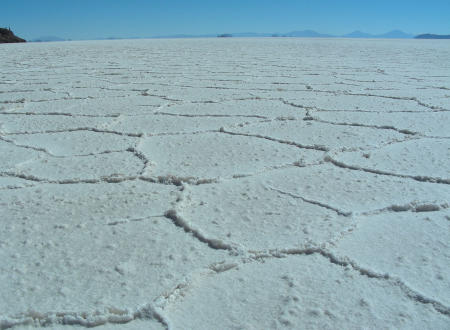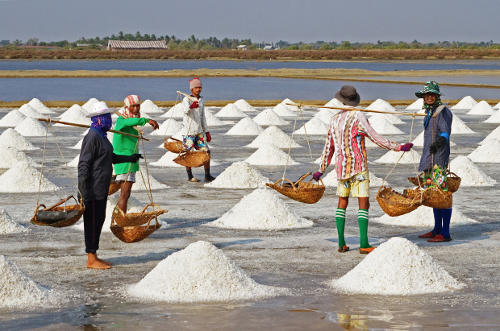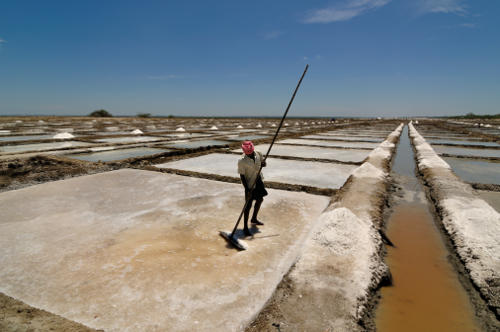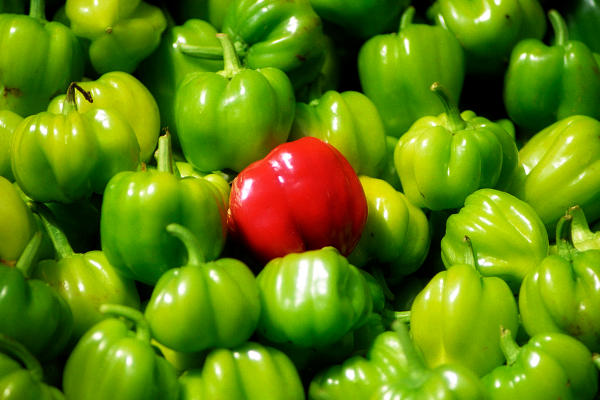A Pepper Grinder Post
Salt of the Earth
I used to have it in my mind that there were two main ways we Christians needed to "witness" to non-believers. One was that we were supposed to talk to everyone about Jesus. While I did very occasionally talk about Jesus to non-Christians, I was pretty much a complete failure at it.
This made me all the more eager to do well at the second type of witnessing I had heard about. This involved living a life that people would admire, and then, when they asked what made you different, you told them about Jesus. I still didn't have much confidence about the telling them about Jesus part of the scheme (probably because I had an almost pathological fear of rejection), but I could at least work on living a life that people would admire.
As I understood it, the key to the second approach was having a life that unbelievers would think was neat, without doing bad things. Your friend was supposed to approach you one day and say something like, "You know, Mark, you are really cool. You play football, you hang out with the guys, and you go out with Kim, who's really popular. Yet you don't cuss or tell dirty jokes or talk about feeling Kim up. What makes you so different?" Then you would tell him about how you had given your heart to Jesus, and he had changed your life, and you'd lead your friend in the Sinner's Prayer.
The thing was, I don't think that anyone ever asked me what made me so different, at least not in an admiring sort of way. I was a skinny nerd who was lousy at sports. I certainly was different, but I was not the kind of kid other kids admired. While a few people around me have become Christians over the years, I never saw hints that I had much to do with it. Until I had kids, I never led anyone to pray to become a Christian.
All of which explains why I was interested in understanding what Jesus meant when he taught the following:
 You are the salt of the earth. But if the salt becomes tasteless, how will it be made salty again? It's good for nothing anymore except throwing outside to be trampled. (Matthew 5:13, my translation)
You are the salt of the earth. But if the salt becomes tasteless, how will it be made salty again? It's good for nothing anymore except throwing outside to be trampled. (Matthew 5:13, my translation)
While this is a pretty well-known saying, I imagine that many would be hard-pressed to explain what it means. A city on a hill? Makes perfect sense. A lamp on a lampstand? Got it. But salt of the earth? Why are Christians like salt of the earth?
Part of our problem is that salt doesn't mean the same thing to us that it did to the people of Christ's day. To us, salt is something we get in the grocery store in navy blue cylinders. It's cheap, we like it in our food, and most of us think we should eat less of it than we do.
In the days of the New Testament, salt was critical. They didn't have refrigerators or even ice, so the only good way to preserve something like meat was to dry it, or salt it, or both. It's kind of interesting (at least to a science geek like me) how this works. When you have water with a high concentration of salt close to water with a low concentration of salt, and a barrier between them that water can pass through (like the wall of a cell), the water will pass from the low salt concentration to the high salt concentration, trying to even out the salinity. This is known as osmosis, and it's actually tied into the Second Law of Thermodynamics (but that's another topic which gets us even farther from where I was going). So, if a bacteria cell comes into salted meat to start chowing down, guess what happens? Osmosis kicks in and sucks the water right out of that bad boy. It kills it. For this reason, salt was also used as a disinfectant in wounds--it would kill any bacteria that got into the wound.
 Salt was also not cheap. The standard way of getting it in the Middle East was to put water from a salty body of water like the Dead Sea (which is saltier than the ocean) into a shallow pit and wait for the water to evaporate, leaving only the salt (actually, there were lots of other minerals in it besides salt, but we'll get to that later). This was a fairly time-consuming and labor-intensive process, making salt a valuable commodity. I have even read that Roman soldiers were given part of their pay in salt. This was called a salarium (the Latin word for salt), which is where the English word, salary, comes from.
Salt was also not cheap. The standard way of getting it in the Middle East was to put water from a salty body of water like the Dead Sea (which is saltier than the ocean) into a shallow pit and wait for the water to evaporate, leaving only the salt (actually, there were lots of other minerals in it besides salt, but we'll get to that later). This was a fairly time-consuming and labor-intensive process, making salt a valuable commodity. I have even read that Roman soldiers were given part of their pay in salt. This was called a salarium (the Latin word for salt), which is where the English word, salary, comes from.
So how are we Christians the salt of the earth? In part, I think this means we are supposed to keep our society from going completely down the toilet. I do not believe that Christians can form a completely godly society. It seems to me that most attempts to do so have not done terribly well, and if there was a "completely Christian" society formed by men, I fear it would turn into something like a Christian version of the Taliban. However, I do think Christians, just like salt in meat, can slow down or even completely halt a society's headlong rush to putrefaction. Just as with salt, I think the more true Christians there are spread around in the society, the less moral and spiritual decay there will be.
What about what salt does for taste? Is there an analogy there as well? I think there is. I believe that, to God, true Christians in a society are the only thing that keeps him from spitting the society out of his mouth like so much mushy, lukewarm oatmeal that got cooked the "healthy" way (with no salt). This is a funny thought, because non-Christians think we are the ones with the boring lives, while they are the ones having "fun". However, I would challenge anyone to look closely at the life of someone who has been consistently living for their own pleasure for some time, and to see how interesting his or her life is. I don't think you would have to dig too far below the surface to find boredom and despair. My main point is not that we Christians have more interesting lives (though I do think, in general, that if we completely surrender our lives to the Lord of the universe, our lives won't be boring) but that, to God, we are the only thing that makes an insipid society palatable.
I want to move on to the mysterious question of how salt can lose its saltiness, but I want to make one more comment about the salt analogy first. To be effective, salt needs to be spread out in the food it is flavoring or preserving. A dish wouldn't taste good if it had parts that were intensely salted (like the anchovies my college roommate liked on his pizza--ugh) and other parts that were bland. A ham wouldn't be very appealing if parts were bristling with salt, while other parts were slimy and rotten. I'm not saying that Christians shouldn't get together for encouragement and support. I'm not saying that Christian parents should throw their little lambs to the wolves of the public school system. I'm just saying that if Christians try to withdraw completely from the secular society around them, they will not be able to function the way salt is supposed to function.
Jesus's warning about salt losing its saltiness has generated various reactions over the years. Some have taken this statement as yet another (according to them) piece of evidence that the Bible is fallible. How can salt possibly lose its flavor? Even if we put a plate of salt outside in the rain, it won't lose its saltiness--it may be washed away, but that salt that soaked into the ground is still salt. Short of whipping out ahome chemistry kit and performing some chemical wizardry, salt remains salt.
 However, remember how we said salt in the Middle East was made in Bible times? Salty water from the Dead Sea was allowed to evaporate in shallow pits, leaving … salt? Well, partly. There certainly was plenty of salt in the residue that remained, but there were also other minerals and compounds. And what would happen if that "salt" got wet? Salt is quite good at being dissolved in water, which means that much of the actual sodium chloride (the chemical formula for salt) would mix with the water and get carried out of the "salt." What would be left would be a pile of minerals with only a faint salty taste. Putting this mixture on your food might have been a little bit like crushing a vitamin pill and sprinkling it on your corn-on-the-cob. Not so good. It isn't hard to imagine someone taking this boring, unpleasant stuff and dumping it outside in the street.
However, remember how we said salt in the Middle East was made in Bible times? Salty water from the Dead Sea was allowed to evaporate in shallow pits, leaving … salt? Well, partly. There certainly was plenty of salt in the residue that remained, but there were also other minerals and compounds. And what would happen if that "salt" got wet? Salt is quite good at being dissolved in water, which means that much of the actual sodium chloride (the chemical formula for salt) would mix with the water and get carried out of the "salt." What would be left would be a pile of minerals with only a faint salty taste. Putting this mixture on your food might have been a little bit like crushing a vitamin pill and sprinkling it on your corn-on-the-cob. Not so good. It isn't hard to imagine someone taking this boring, unpleasant stuff and dumping it outside in the street.
And what does it mean for a believer to lose his saltiness? I believe it means that the Christian ceases to be significantly different from those around him. I believe that when a person comes to belong to God, God invades every part of her life and begins the long process of touching and changing every aspect of that life. We can either cooperate with this process, or we can fight against it. This process is a kind of divine alchemy, whereby the bland or bitter minerals in us are turned to pure salt. The thing is, the more salty we become, the more we will stick out. Perhaps if a meat cell in a slice of ham had a brain, it would realize how salt protects it and be grateful. On the other hand, it still wouldn't want to snuggle up to the salt. Salt is completely different than meat. It burns and sucks moisture out of those meat cells the same way it does out of the bacteria.
The trouble with the notions I used to have about being "a good witness," is that they were tied as much into being popular as they were into living for Christ. "Be a popular person who avoids doing bad things, and people will want to come to Jesus," was the real message I had imbibed. The problem with this (besides the personal problem that I was completely unequipped to be popular), is that salt doesn't win popularity contests. It may earn grudging respect, but it can't expect to be liked by the food it is mixed into.
It seems to me that some Christians try to be like lite salt. A little salty, but not too much. This seems like a dangerous approach. What will happen when rain storms of trouble fall on us? Will the real salt be washed away and only the other substances left?
My personal weakness is to try to be like candy-coated salt. The real me is salty, but I try to hide behind a bland, inoffensive exterior. The trouble with this is that salt can't do what salt is supposed to do if it is sealed off from the cells around it. It's got to be right out there, mixing with the meat and sucking the life blood out of bacteria.
So what should we do? Carry around a Bible all the time and wear a big cross? Not necessarily. It will be obvious that salt is salt just by its nature. I believe that if we simply try to live our lives and make our decisions based on the Bible, we will stick out like sore thumbs without even trying.
 As I have mentioned, I tend to be someone, who tries not to foist his Christianity on non-Christians. And yet, I have found that just trying to live by my convictions makes it obvious that I am different. For example, my wife and I have eight children. The Bible clearly teaches that children are a blessing, and we have tried to make our reproductive decisions based on that premise. As soon as most people hear that I have eight children, their mouths drop open. Some of them start trying to put it together: "Are you Amish? Are you a Mormon? Are you Catholic?" They know normal people don't have eight kids (even though we know a number of families with considerably more children than that). They see right away that this guy is really weird, and they want to figure it out. Not that I have ever had someone hear that I had eight kids and fall to his knees saying, "Sir, what must I do to be saved?" However, I believe it is a starting point. They see a life they cannot imagine living, and they know some powerful force must be at work. I have gotten reactions almost as strong when people find out that my wife and I have lived our entire married life without a TV.
As I have mentioned, I tend to be someone, who tries not to foist his Christianity on non-Christians. And yet, I have found that just trying to live by my convictions makes it obvious that I am different. For example, my wife and I have eight children. The Bible clearly teaches that children are a blessing, and we have tried to make our reproductive decisions based on that premise. As soon as most people hear that I have eight children, their mouths drop open. Some of them start trying to put it together: "Are you Amish? Are you a Mormon? Are you Catholic?" They know normal people don't have eight kids (even though we know a number of families with considerably more children than that). They see right away that this guy is really weird, and they want to figure it out. Not that I have ever had someone hear that I had eight kids and fall to his knees saying, "Sir, what must I do to be saved?" However, I believe it is a starting point. They see a life they cannot imagine living, and they know some powerful force must be at work. I have gotten reactions almost as strong when people find out that my wife and I have lived our entire married life without a TV.
So what does it mean to be the salt of the earth? Does it mean to be a normal person who avoids doing certain bad things? No, it means allowing God to make us utterly and totally different, even while we continue to live in the midst of people with whom we no longer fit in. It means not taking anything for granted, but trying to hold every decision up to the light of the Bible. It means being different.
- Pepper
Posted 2015-07-06
*Photo Credits: Uyuni Salt Lake in Bolivia by Stella Bogdanic, photo of peppers by kkitsos, photo of 5 workers at salt farm in Thailand from Wikipedia article on sea salt, photo of solitary man on large Indian salt farm from Wiki Sea Salt entry on www.upcscavenger.com.
